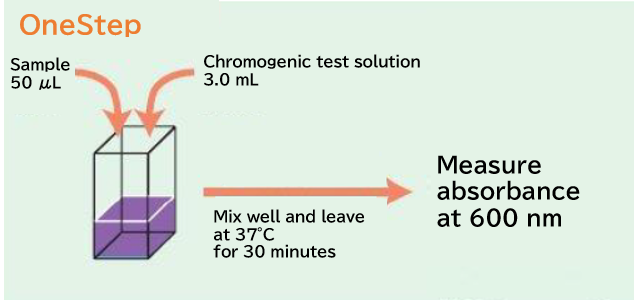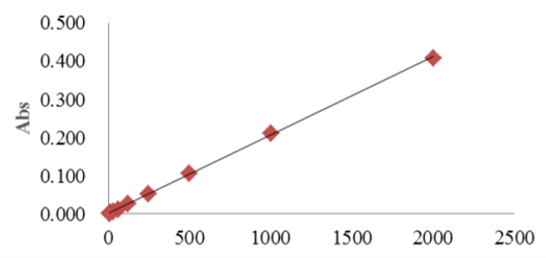Protein Assay Rapid Kit wako Ⅱ
Assay Rapid Kit wako II is a kit for measuring total protein in samples.
Various protein assays are currently available, but many of the test methods involve contamination of test tubes, glassware, etc. This product was developed based on a colorimetric method using pyrogallol red (PR) as dye.
Chromogenic test solutions rarely contaminate equipment during ordinal use and are simple to operate.
Features
- One-step quantification
- No need to dilute chromogenic test solution
- Reaction time is 30 minutes.
- Less contamination of equipment with chromogenic test solution.
Measurement principle

Pyrogallol red (PR) binds to molybdate to form a red complex with maximum absorption at 470 nm. When this complex binds to proteins under acidic conditions, it becomes bluish-purple due to a shift in wavelength. The total protein concentration in the sample is determined by measuring the absorbance in the vicinity of 600 nm.
Procedure (cell method)

- Mix 50 μL of sample and 3.0 mL of chromogenic test solution thoroughly.*1
- Warm at 37°C for 30 minutes.
- Measure the absorbance at 600 nm.
- Calculate the protein concentration from a calibration curve.
*1 In the microplate method, mix 10 μL of sample and 250 μL of chromogenic test solution.
-
Kit composition
- Chromogenic test solution: 310 mL
- Standard BSA solution (2 mg/mL): 5 mL
-
Measurement range
- Cell method: 62.5 to 2,000 μg/mL
- Microplate method: 125 to 2,000 μg/mL
Example of calibration curve (cell method)
Influence of coexisting substances
It is demonstrated that when BSA (concentration 500 μg/mL) is used as a standard preparation, the influence of coexisting substances as measured by absorbance is within ± 10% relative to blank.
-
Compounds Acceptable coexisting concentration Ammonium Sulfate 0.8 mol/L Dithiothreitol 0.5 mol/L EDTA 0.4 mol/L EGTA 0.04 mol/L Fructose 0.1 mg/mL Glucose 0.1 mg/mL Glutathione(Reduced) 0.5 mg/mL Glycerol 50 v/v% Glycine 0.1 mol/L Guanidine HCl 0.1 mol/L HEPES 0.1 mol/L HCl 1 mol/L KCl 1 mol/L MgCl2・6H2O 1 mol/L -
Compounds Acceptable coexisting concentration 2-Mercaptoethanol 0.5 mol/L MES 0.7 mol/L MOPS 0.2 mol/L NaCl 4 mol/L NaOH 0.02 mol/L Sodium Dihydrogenphosphate Dihydrate 1 mol/L PIPES 0.5 mol/L SDS ※2 0.01 w/v% Sodium Azide 0.2 w/v% Sucrose 40 w/v% Triton X-100 0.07 w/v% Tris 2 mol/L Tween 20 0.1 w/v% Urea 6 mol/L *2: This product tends to be interfered by SDS. Avoid using the product in the presence of SDS, although it has been shown that a calibration curve can be prepared with 0.01% SDS, provided the BSA concentration is in the range of 250 to 2,000 μg/mL.
Product List
- Open All
- Close All
For research use or further manufacturing use only. Not for use in diagnostic procedures.
Product content may differ from the actual image due to minor specification changes etc.
If the revision of product standards and packaging standards has been made, there is a case where the actual product specifications and images are different.
The prices are list prices in Japan.Please contact your local distributor for your retail price in your region.




